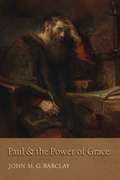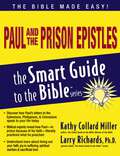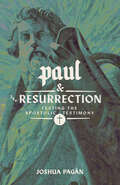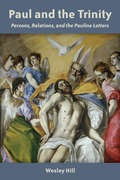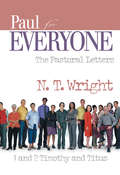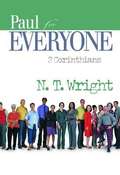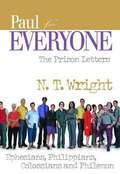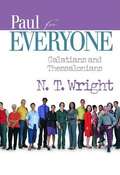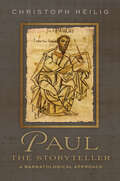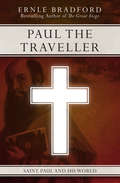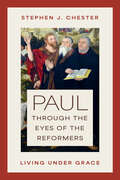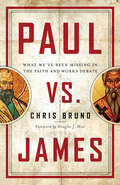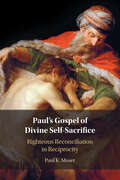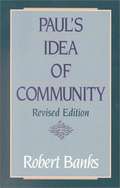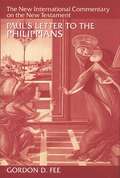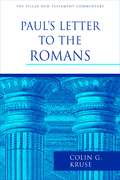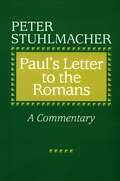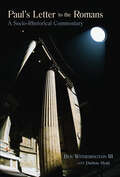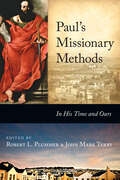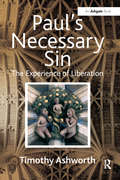- Table View
- List View
Paul and the Power of Grace
by John M. BarclayPaul and the Gift transformed the landscape of Pauline studies upon its publication in 2015. In it, John Barclay led readers through a recontextualized analysis of grace and interrogated Paul&’s original meaning in declaring it a &“free gift&” from God, revealing grace as a multifaceted concept that is socially radical and unconditioned—even if not unconditional. Paul and the Power of Grace offers all of the most significant contributions from Paul and the Gift in a package several hundred pages shorter and more accessible. Additionally, Barclay adds further analysis of the theme of gift and grace in Paul&’s other letters—besides just Romans and Galatians—and explores contemporary implications for this new view of grace.
Paul and the Prison Epistles (The Smart Guide to the Bible Series)
by Kathy Collard MillerSome of the most joy-filled books in the New Testament were written from a small, dark prison cell. Although hungry, cold, and scarred, Paul exalted his savior's love and grace to the Ephesians, Philippians, and Colossians. How was Paul able to rest so securely? And how can you today? The Smart Guide to the BibleTM: Paul and the Prison Epistles will brighten your life by illuminating how God is with you in all your circumstances. You'll be uplifted by Paul's instructions for finding joy in suffering, engaging in spiritual warfare, receiving God's love, living out your faith, and so much more. You, too, will be able to rejoice in the Lord always!Be Smart About:Pauls' CircumstancesJoy No Matter WhatSpiritual WarfareGod's GraceWhy Paul Wrote His lettersLiving Out Your Faith
Paul and the Resurrection: Testing the Apostolic Testimony
by Joshua A. PagánFor the contemporary believer, Paul's role in the historical setting of the Resurrection is far more than a matter of theological curiosity. The Christian justification for rational belief in the Resurrection is in large part anchored in Paul's justification for rational belief in the authenticity of his own experience. In Paul we find the earliest and best attested documentary evidence for a historical investigation of the miraculous event. Moreover, his epistles are an indispensable source of independent corroboration of the gospel narratives. Opponents of Christianity have formulated a variety of hypotheses to account for Paul's experience on the Damascus Road. Some propose that Paul was deceptive; others argue that he was deluded; and still others contend he came to believe a legendary development. Yet according to the Christian hypothesis, Paul's claim to have encountered the risen Jesus is dependable, and his testimony can be shown to withstand the scrutiny of critics. In this innovative, interdisciplinary study, PagÁn combines the analytic tools of history and philosophy to explore and evaluate competing explanations of Paul's belief in the Resurrection of Jesus.
Paul and the Rhetoric of Reversal in 1 Corinthians
by Matthew R. MalcolmThe first letter to the Corinthians is one of the most discussed biblical books in New Testament scholarship today. Despite this, there has been no consensus on its arrangement and central theme, in particular why the topic of the resurrection was left until the end of the letter, and what its theological significance would have been to the Corinthian church. Matthew R. Malcolm analyses this rhetoric of 'reversal', examines the unity of the epistle, and addresses key problems behind particular chapters. He argues that while Jewish and Greco-Roman resources contribute significantly to the overall arrangement of the letter, Paul writes as one whose identity and rhetorical resources of structure and imagery have been transformed by his preaching, or kerygma, of Christ. The study will be of interest to students of New Testament studies, Pauline theology and early Christianity.
Paul and the Trinity: Persons, Relations, and the Pauline Letters
by Wesley HillPaul’s ways of speaking about God, Jesus, and the Spirit are intricately intertwined: talking about any one of the three, for Paul, implies reference to all of them together. However, much current Pauline scholarship discusses Paul’s God-, Christ-, and Spirit-language without reference to trinitarian theology.In contrast to that trend, Wesley Hill argues in this book that later, post-Pauline trinitarian theologies represent a better approach, opening a fresh angle on Paul’s earlier talk about God the Father, Jesus Christ, and the Spirit. Hill looks critically at certain well-known discussions in the field of New Testament studies -- those by N. T. Wright, Richard Bauckham, Larry Hurtado, and others -- in light of patristic and contemporary trinitarian theologies, resulting in an innovative approach to an old set of questions.Adeptly integrating biblical exegesis and historical-systematic theology, Hill’s Paul and the Trinity shows how trinitarian theologies illumine interpretive difficulties in a way that more recent theological concepts have failed to do.Watch a 2015 interview with the author of this book here:
Paul as an Administrator of God in 1 Corinthians
by John K. GoodrichThis book looks in detail at Paul's description of apostles in 1 Corinthians 4 and 9 as divinely appointed administrators (oikonomoi) and considers what this tells us about the nature of his own apostolic authority. John Goodrich investigates the origin of this metaphor in light of ancient regal, municipal, and private administration, initially examining the numerous domains in which oikonomoi were appointed in the Graeco-Roman world, before situating the image in the private commercial context of Roman Corinth. Examining the social and structural connotations attached to private commercial administration, Goodrich contemplates what Paul's metaphor indicates about apostleship in general terms as well as how he uses the image to defend his apostolic rights. He also analyses the purpose and limits of Paul's authority - how it is constructed, asserted, and contested - by examining when and how Paul uses and refuses to exercise the rights inherent in his position.
Paul for Everyone
by N. T. WrightWriting in an approachable and anecdotal style, Tom Wright helps us to see the pastoral nature of these letters. Paul is anxious to see that those who profess the faith should allow the gospel to transform the whole of their lives, right down to the deepest part of their personality, and is concerned that every teacher of the faith should know how to build up the community in mutual support, rather than tearing it apart through the wrong sort of teaching and behavior. Tom Wright has undertaken a tremendous task: to provide guides to all the books of the New Testament, and to include in them his own translation of the entire text. Each short passage is followed by a highly readable discussion, with background information, useful explanations and suggestions, and thoughts as to how the text can be relevant to our lives today. A glossary is included at the back of the book. The series is suitable for group study, personal study, or daily devotions.
Paul for Everyone: 2 Corinthians
by N. T. WrightMaking use of his scholar's understanding, yet writing in an approachable and anecdotal style, Tom Wright helps us to understand from the beginning of the second letter to the Corinthians that something unexplained yet terrible has happened. We feel the pain of Paul from the very opening lines as he confronts dreadful issues of sorrow and hurt, emerging with a clearer picture of what it meant to say that Jesus himself suffered for us and rose up in triumph. The letter itself moves through tragedy and from there leads into the sunlight. Tom Wright has undertaken a tremendous task: to provide guides to all the books of the New Testament, and to include in them his own translation of the entire text. Each short passage is followed by a highly readable discussion, with background information, useful explanations and suggestions, and thoughts as to how the text can be relevant to our lives today. A glossary is included at the back of the book. The series is suitable for group study, personal study, or daily devotions.
Paul for Everyone: Ephesians, Philippians Colossians and Philemon
by N. T. WrightMaking use of his scholar's understanding, yet writing in an approachable and anecdotal style, Tom Wright captures the verve and sparkle of these letters. Paul wrote the letters while in prison facing possible death, but their passion and energy are undimmed. They reveal Paul's longing to see young churches grow in faith and understanding, rooted in Jesus himself, and to see this faith worked out in practice. Wright's stimulating comments are combined with his own fresh and inviting translation of the text. Tom Wright has undertaken a tremendous task: to provide guides to all the books of the New Testament, and to include in them his own translation of the entire text. Each short passage is followed by a highly readable discussion, with background information, useful explanations and suggestions, and thoughts as to how the text can be relevant to our lives today. A glossary is included at the back of the book. The series is suitable for group study, personal study, or daily devotions.
Paul for Everyone: Galatians and Thessalonians
by N. T. WrightTom Wright's eye-opening comments on these letters are combined, passage-by-passage, with his fresh and inviting new translation of the Bible text. Making use of his true scholar's understanding, yet writing in an approachable and anecdotal style, Wright captures the tension and excitement of the time as the letters seek to assert Paul's authority and his teaching against other influences. Tom Wright has undertaken a tremendous task: to provide guides to all the books of the New Testament, and to include in them his own translation of the entire text. Each short passage is followed by a highly readable discussion, with background information, useful explanations and suggestions, and thoughts as to how the text can be relevant to our lives today. A glossary is included at the back of the book. The series is suitable for group study, personal study, or daily devotions.
Paul the Storyteller: A Narratological Approach
by Christoph HeiligAn incisive study of Paul&’s use of stories and narratives in his letters Paul is often thought of as a crafter of numerous and complex arguments, but some scholars, such as N. T. Wright and Richard Hays, have shown that narratives are vitally important in his letters. Through careful examination of the texts, Christoph Heilig demonstrates that Paul is indeed a talented teller of stories—not only explicit narratives but also implicit stories. In this volume, after a decade of research and writing, Heilig presents his definitive report on narrative in Paul. While Richard Hays and N. T. Wright have argued that Paul&’s letters contain implicit narratives, Heilig stresses that a sound methodology requires beginning with text-linguistic investigation of explicit narratives. As Heilig argues, focusing on explicit narratives repeatedly redirects our attention to implicit (&“almost&”) stories. On this basis, he shows that Hays&’s &“narrative substructures&” and Wright&’s &“worldview&” narratives can also be fruitfully integrated into a narratological approach. Paul is a different kind of storyteller than the gospel writers, for example, but at countless points miniature narratives play a crucial role for Paul&’s communicative goals. Students and scholars of the New Testament will welcome Heilig&’s expert guidance through a hotly debated area of Pauline studies.
Paul the Traveller: Saint Paul and his World
by Ernle BradfordThe life of the first-century man born Saul of Tarsus, who went on to become Paul the Apostle, by the acclaimed historian and author of Thermopylae. Paul, born into Asia Minor&’s Jewish aristocracy and a passionate student of scripture, was part of the crowd that killed Stephen, a deacon regarded as the first Christian martyr. But on the road to Damascus, Paul experienced a miracle that would change his life and in turn change history. His conversion left him convinced that his true master was the man who would come to be known as Jesus Christ. Drawing on his vast command of ancient history and blending it with superb storytelling skills, author Ernle Bradford weaves a tale that takes the reader from city to city as Paul spreads the teachings of Christ despite being beaten, stoned, and shipwrecked. It&’s a thrilling tale and stirring biography of a man whose devotion and rhetorical genius laid the groundwork for the religion that soon swept the civilized world. Written by a historian known for immersing himself in his subjects, which range from the ancient world to World War II, this is a fascinating look at the convert who helped shape Christianity as a worldwide force.
Paul through the Eyes of the Reformers: Living under Grace
by Stephen J. ChesterA brilliant reappraisal of Protestant Reformers&’ views on Paul In this incisive book, Stephen Chester challenges misconceptions and provides new insights into how sixteenth-century Protestant Reformers interpreted the writings of Paul. Writing for those who are interpreting Pauline letters in and for today&’s world, Chester demonstrates the value of a nuanced and accurate understanding of the Reformers&’ views on Paul. Throughout the book, Chester draws on key ideas from his monumental work Reading Paul with the Reformers, which won Christianity Today&’s book of the year award in biblical studies. In Paul through the Eyes of the Reformers, Chester updates the argument and presents the ideas in a shorter and more accessible form designed for a broad readership. To help readers better understand the Reformers&’ historical and theological context, Chester surveys perspectives on Paul prior to the sixteenth century. Against this background, Chester illuminates the paradigm shifts in Pauline interpretation that unfolded during the Reformation, paying special attention to the work of Martin Luther, Philip Melanchthon, and John Calvin. He also discusses the promise and challenge of reading Paul with the Reformers today, highlighting the importance of engaging with the Reformers&’ work critically, reaching different conclusions from them where necessary, and taking inspiration from them when appropriate. Paul through the Eyes of the Reformers is a remarkable resource for biblical scholars who care about Paul and his theology.
Paul vs. James: What We've Been Missing in the Faith and Works Debate
by Chris Bruno"I welcome Chris Bruno&’s readable and thoroughly biblical exploration of faith and works. He sets the matter in both its wider biblical context at the same time as he makes clear its relevance and importance to faithful Christian living today." –Douglas J. Moo from the ForewordEverything you never knew about the men behind the controversy.Put James and Paul next to each other and some tough-to-answer questions come up. Paul says we&’re saved by faith alone, not works—and James seems to say the opposite. If you&’ve been around the church for a while, you probably know enough to say "the right thing" if someone asked about these verses. But would your answers hold up to scrutiny? If pressed, would you know what to say? Dive into the life stories of both apostles, learn more about the context of their letters, and discover the truth about the shared message they both proclaimed. No more canned answers or lingering questions, gain confidence and go deeper in Paul vs. James.
Paul vs. James: What We've Been Missing in the Faith and Works Debate
by Chris Bruno"I welcome Chris Bruno&’s readable and thoroughly biblical exploration of faith and works. He sets the matter in both its wider biblical context at the same time as he makes clear its relevance and importance to faithful Christian living today." –Douglas J. Moo from the ForewordEverything you never knew about the men behind the controversy.Put James and Paul next to each other and some tough-to-answer questions come up. Paul says we&’re saved by faith alone, not works—and James seems to say the opposite. If you&’ve been around the church for a while, you probably know enough to say "the right thing" if someone asked about these verses. But would your answers hold up to scrutiny? If pressed, would you know what to say? Dive into the life stories of both apostles, learn more about the context of their letters, and discover the truth about the shared message they both proclaimed. No more canned answers or lingering questions, gain confidence and go deeper in Paul vs. James.
Paul's Gospel of Divine Self-Sacrifice: Righteous Reconciliation in Reciprocity
by Paul MoserIn this book, Paul Moser explains how self-sacrificial righteousness of a reparative kind is at the heart of Paul's gospel of God. He also shows how divine self-sacrifice authenticates that gospel via human reciprocity toward God in reconciliation. A basis for this reciprocity lies in a teaching of ancient Judaism that humans are to reciprocate toward God for the sake of an interpersonal relationship that is righteous and reconciled through voluntary self-sacrifice to God. Moser demonstrates that Paul's gospel calls for faith, including trust, in God as reciprocity in human self-sacrifice toward God. Although widely neglected by interpreters, this theme brings moral and evidential depth to Paul's good news of reparative redemption from God. Moser's study thus enables a new understanding of some of the controversial matters regarding Paul's message in a way that highlights the coherence and profundity of his message.
Paul's Idea Of Community: The Early House Churches In Their Cultural Setting
by Robert BanksRobert Bank's widely read "Paul's Idea of Community: The Early House Churches in their Cultural Setting" is once again available to laypeole, pastors and scholars alike. In this extensively revised edition Banks has rewritten chapters for clarity, taken into account recent scholarship on Paul's writings, updated and expanded the bibliography, and added an index. This new edition retains, however, all the freshness and vitality of the original.
Paul's Letter to the Philippians (New International Commentary on the New Testament (NICNT))
by Gordon D. Fee"“. . . undertaken to provide earnest students of the New Testament with an exposition that is thorough and abreast of modern scholarship and at the same time loyal to the Scriptures as the infallible Word of God.”"This statement reflects the underlying purpose of The New International Commentary on the New Testament. Begun in the late 1940s by an international team of New Testament scholars, the NICNT series has become recognized by pastors, students, and scholars alike as a critical yet orthodox commentary marked by solid biblical scholarship within the evangelical Protestant tradition.While based on a thorough study of the Greek text, the commentary introductions and expositions contain a minimum of Greek references. The NICNT authors evaluate significant textual problems and take into account the most important exegetical literature. More technical aspects — such as grammatical, textual, and historical problems — are dealt with in footnotes, special notes, and appendixes.Under the general editorship of three outstanding New Testament scholars — first Ned Stonehouse (Westminster Theological Seminary, Philadelphia), then F. F. Bruce (University of Manchester, England), and now Gordon D. Fee (Regent College, Vancouver, British Columbia) — the NICNT series has continued to develop over the years. In order to keep the commentary “new” and conversant with contemporary scholarship, the NICNT volumes have been — and will be — revised or replaced as necessary.The newer NICNT volumes in particular take into account the role of recent rhetorical and sociological inquiry in elucidating the meaning of the text, and they also exhibit concern for the theology and application of the text. As the NICNT series is ever brought up to date, it will continue to find ongoing usefulness as an established guide to the New Testament text.
Paul's Letter to the Philippians: A Socio-Rhetorical Commentary
by Ben Witherington IIIInterprets Paul’s letter in light of its rhetorical content and cultural contextSkeptical of the trend among many biblical scholars to analyze Paul’s short, affectionate letter to the Philippians in light of Greco-Roman letter-writing conventions, Ben Witherington instead looks at Philippians as a masterful piece of long-distance oratory — an extension of Paul’s oral speech, dictated to a scribe and meant to be read aloud to its recipients. Witherington examines Philippians in light of Greco-Roman rhetorical conventions, identifying Paul’s purpose, highlighting his main points and his persuasive strategies, and considering how his original audience would have heard and received Paul’s message.
Paul's Letter to the Romans (The Pillar New Testament Commentary (PNTC))
by Colin G. KrusePaul's Letter to the Romans may well be the most influential book in Christian history. In this Romans commentary Colin Kruse shows how Paul expounds the gospel against the background of God's sovereign action as creator, judge, and redeemer of the world. Valuable "additional notes" on important theological themes and difficult texts -- such as Paul's discussion of same-sex relationships, the salvation of "all Israel," and the woman Junia, who was "well known among the apostles" -- further connect Romans to contemporary issues. Throughout his commentary Kruse expertly guides readers through the plethora of interpretations of Romans, providing a reliable exposition of this foundational epistle.
Paul's Letter to the Romans: A Commentary
by Peter StuhlmacherIn this book, Peter Stuhlmacher stresses the Old Testament and postbiblical Jewish traditions as the primary backdrop to Paul's thought, as these traditions were known by Paul himself or mediated to him through Jesus and the early church. The themes of the righteousness of God and the corresponding justification of both Jews and Gentiles are viewed as the center of Romans. Finally, Stuhlmacher seeks to place the apostle's theology within its historical context. He overcomes the false dichotomy that has often characterized the study of Romans, mediating between the view that it is a general theological treatise that functions as Paul's last testament to his Christian faith, on the one hand, and the view that it is one particular and occasion-bound expression of Paul's thinking.
Paul's Letter to the Romans: A Socio-Rhetorical Commentary
by Ben Witherington IIIWhile Paul’s letter to the Romans is the most studied and commented-on document from the biblical period, the major exegetical books on Romans from the nineteenth and twentieth centuries have been overwhelmingly shaped by the Reformed tradition. Through a careful survey of work on Romans by both ancient Church Fathers and modern exegetical scholars, Ben Witherington III here argues that the interpretation of Romans since the Reformation has been far too indebted to — and at key points led astray by — Augustinian readings of the text as filtered through Luther, Calvin, and others. In this first full-scale socio-rhetorical commentary on Romans, Witherington gleans fresh insights from reading the text of Paul’s epistle in light of early Jewish theology, the historical situation of Rome in the middle of the first century A.D., and Paul’s own rhetorical concerns. Giving serious consideration to the social and rhetorical background of Romans allows readers to hear Paul on his own terms, not just through the various voices of his later interpreters. Witherington’s groundbreaking work also features a new, clear translation of the Greek text, and each section of the commentary ends with a brief discussion titled “Bridging the Horizons,” which suggests how the ancient text of Romans may speak to us today.
Paul's Missionary Methods: In His Time and Ours
by Robert L. PlummerMissionary Methods: Saint Paul's or Ours?Paul's Missionary MethodsMichael F. BirdEckhard J. SchnabelBenjamin L. MerkleChristoph W. StenschkeDon N. Howell Jr.Craig KeenerDavid J. HesselgraveMichael PocockEd StetzerM. David SillsChuck LawlessJ. D. Payne
Paul's Necessary Sin: The Experience of Liberation
by Timothy AshworthHow can we know today what was happening in the minds and hearts of Paul and the first Christians so long ago? By getting below the surface of Paul's theology, the consistent key elements of early Christian experience are revealed in a way that throws light on the meaning of powerful religious experiences and movements both in the past and today. Illuminating for those who have never read a word on Paul yet disturbing and provocative for biblical scholars, this book tackles the topic of the religious experience of Paul and the first Christians. Lacking authentic knowledge of Paul's liberating experience, generations of translators and interpreters have inevitably and sometimes clumsily obscured Paul's meaning. In this book the scholarly accusation that Paul is incoherent is turned upside down to show how uncritically accepted ways of translating Paul mislead today's reader and introduce a mystifying complexity into scholarship on Paul. Taking the reader step-by-step through a painstaking restoration of the meaning of Paul's text, the colour and form of Paul's original vision are revealed.
Paul's New Perspective: Charting a Soteriological Journey
by Garwood P. AndersonThe debate between proponents of the Old and New perspectives on Paul has been followed closely over the years, consolidating allegiances on either side. But the debate has now reached a stalemate, with defectors turning to apocalyptic and other solutions. Garwood Anderson recounts the issues and concludes that "both 'camps' are right, but not all the time." And with that teaser, he rolls up his exegetical sleeves and proceeds to unfold a new proposal for overcoming the deadlock. But in a field crowded with opinions, could anything new emerge? Anderson's interaction with Paul and his interpreters is at the highest level, and his penetrating and energetic analysis captures attention. What if Paul's own theological perspective was contextually formed and coherently developed over time? Have we asked justification to carry a burden it was never meant to bear? Would fresh eyes and a proper sequencing of Paul's letters reveal Paul's own new perspective? Might we turn a corner and find a bold and invigorating panorama of Pauline soteriology? This is a Pauline study worthy of its great theme, and one that will infuse new energy into the quest for understanding Paul's mind and letters.
